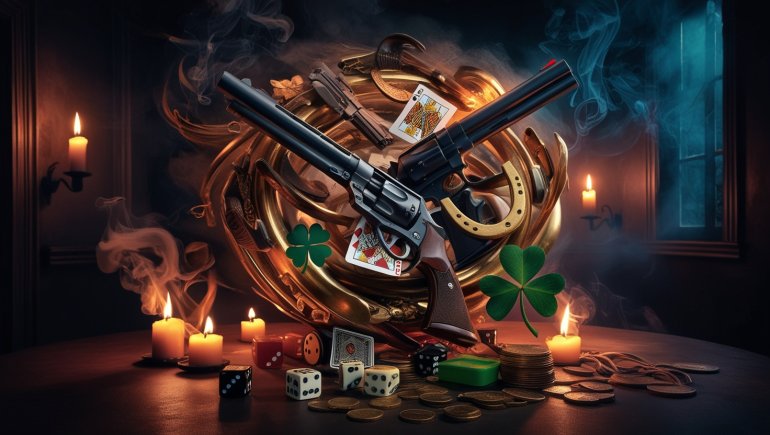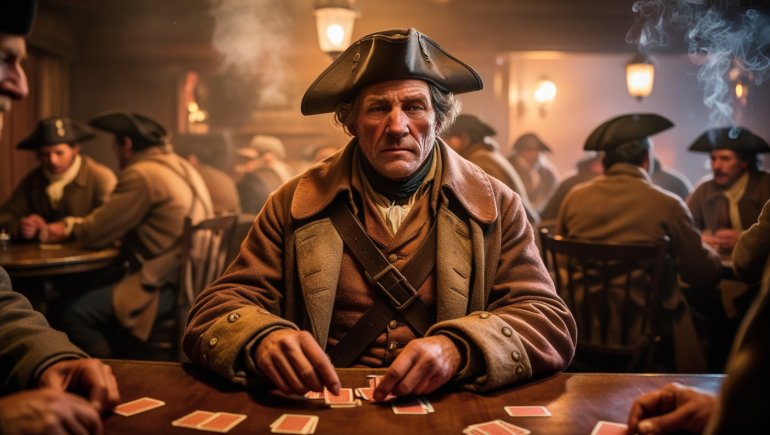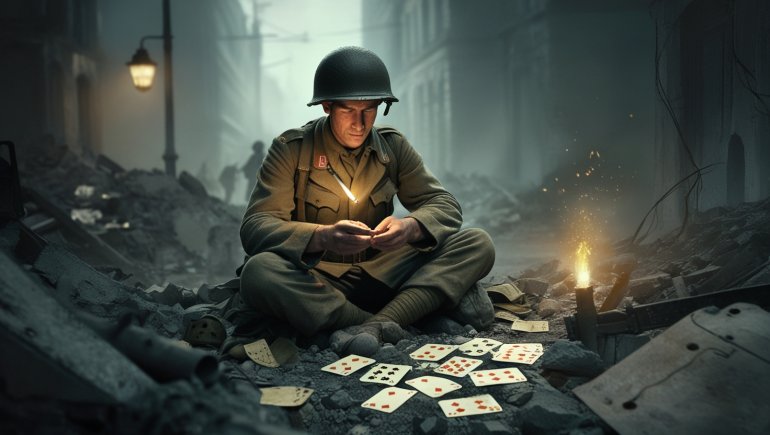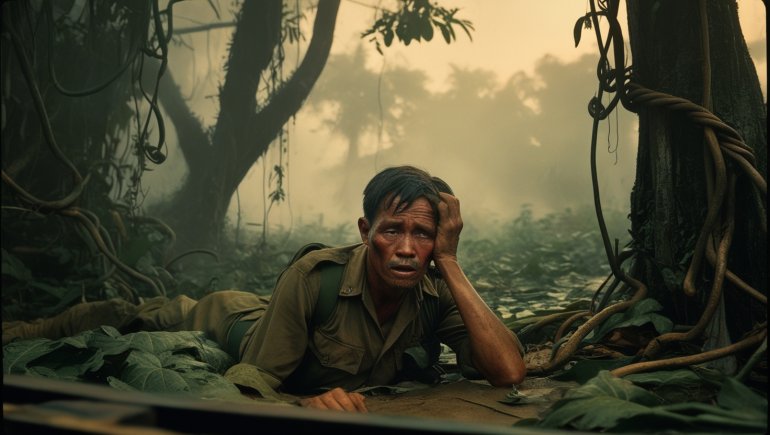
Throughout history, warfare has been intertwined with another realm of risk and chance: gambling. From ancient battlefields to modern military bases, soldiers have found solace, excitement, and sometimes trouble in games of chance. This enduring relationship between gambling and military life offers a unique lens through which to view the human experience of war.
The practice of gambling among soldiers dates back to the earliest recorded conflicts. Ancient artifacts and historical accounts reveal that warriors have long sought the thrill of wagering in the face of mortality. In Roman legions, Greek phalanxes, and medieval armies, dice rattled, and coins changed hands as readily as swords clashed.
This article on Casinoz explores the fascinating and complex history of gambling in military contexts. We'll examine how games of chance have served as both a unifying force and a potential threat to discipline, how they've reflected the cultures of their times, and how military leaders have grappled with their presence.
From ancient times, gambling has remained a constant companion to soldiers facing the extremes of human experience. It has offered an escape from the horrors of war, a means of forging bonds among comrades, and sometimes a path to financial ruin.
The tale of gambling at war is ultimately a story about humanity – our need for excitement, our search for meaning in chaos, and our enduring ability to find moments of levity even in the darkest circumstances.
Historical Examples of Gambling at Wars
Throughout history, gambling has been an ever-present aspect of military life. Let's explore some notable examples across different eras.
Ancient Rome Wars
Roman legionaries were avid gamblers, with dice games being particularly popular. The game of "tali" or knucklebones was widespread, and soldiers often carved their own dice from bone or ivory. Gambling was so prevalent that some military leaders, like Julius Caesar, had to impose restrictions to maintain discipline.

Wars in Medieval Europe
During the Crusades, card games gained popularity among European soldiers. Despite religious prohibitions, crusaders often gambled during their long campaigns. Chess also emerged as a popular game, blending strategy and wagering.
American Civil War
The American Civil War saw a boom in gambling, particularly with the rise of poker. Soldiers on both sides whiled away hours between battles playing cards, with stakes ranging from trivial to significant. General Ulysses S. Grant was known to enjoy a game, while Confederate General Nathan Bedford Forrest reportedly won over $70,000 in poker games during the war.

World War I
The trenches of World War I became hotbeds of gambling activity. Soldiers engaged in various forms of betting to pass the time and distract from the horrors around them. Popular games included:
- Crown and Anchor: A dice game originating in the British Royal Navy;
- Two-up: An Australian coin-tossing game that gained widespread popularity;
- Craps: Dice games flourished due to the ease of carrying dice;
- Betting on rat-catching contests and lice races also emerged as uniquely grim forms of entertainment in the trenches.
World War II
Gambling during World War II was widespread across all theaters of war. Some notable aspects include:
- Betting Pools: Soldiers organized pools on various outcomes, from battle results to movie star marriages.
- Card Games: Poker and bridge remained popular, with high-stakes games sometimes involving officers.
- Improvised Games: Soldiers created games based on local conditions, such as betting on which raindroplets would first reach the bottom of a window.
The Italian campaign saw a particular surge in gambling activity, with some soldiers reportedly making small fortunes through clever betting and card-playing.

In both world wars, military authorities struggled to balance the morale-boosting aspects of gambling with its potential to cause financial problems and disciplinary issues. This tension between the benefits and drawbacks of military gambling would continue into modern conflicts.
Gambling in Modern Military Conflicts
As warfare has evolved in recent decades, so too has the nature of gambling within military contexts. This section explores how gambling has manifested in more recent conflicts and how technology has impacted military gambling practices.
Vietnam War Era
The Vietnam War saw widespread gambling among U.S. troops:
- Card games, particularly poker, were ubiquitous in base camps and firebases.
- Craps games were popular due to the ease of carrying dice.
- Some soldiers engaged in high-stakes games, occasionally leading to significant financial losses and disciplinary issues.
- Betting on sports events broadcast on Armed Forces Radio was common.
Gulf War and Iraq War
These conflicts saw a shift in gambling practices due to changing military structures and technology:
- Shorter deployment cycles and stricter regulations made organized gambling less prevalent.
- Personal electronic devices allowed for new forms of entertainment, partially supplanting traditional gambling.
- However, card games and sports betting pools remained popular among troops.
Afghanistan Conflict
The prolonged nature of the Afghanistan War created unique gambling environments:
- Forward Operating Bases (FOBs) sometimes developed their own gambling cultures.
- Some units organized poker tournaments as morale-boosting events.
- Betting on drone strike outcomes was reported in some units, raising ethical concerns.
Psychological Aspects of Gambling in Military Contexts
The prevalence of gambling in military settings is not merely coincidental. It serves several psychological functions for soldiers facing the extreme stress and uncertainty of war:
Stress Relief and Distraction
Gambling provides a crucial escape mechanism for soldiers dealing with the constant threat of danger and death. The focus required by games of chance offers a temporary reprieve from the harsh realities of war.
This mental diversion can be a vital coping strategy, allowing soldiers to maintain psychological resilience in challenging environments.
For instance, during the Vietnam War, soldiers often played card games or dice rolls between patrols, momentarily shifting their attention from the jungle's pervasive dangers to the bet's immediate thrill.
Bonding and Camaraderie
Gambling activities foster social connections among troops, creating shared experiences that strengthen unit cohesion. The communal nature of many gambling games provides opportunities for soldiers to interact in a non-combat context, building relationships crucial for morale and battlefield performance.
In World War II, for example, nightly poker games in Allied barracks not only passed the time but also helped forge lasting friendships among soldiers from diverse backgrounds.
Control and Agency
In the highly regimented and often chaotic environment of war, gambling offers soldiers a sense of control over their fate, even if illusory.
The ability to make decisions and potentially influence outcomes through gambling can be psychologically empowering for individuals who otherwise have little control over their circumstances.
Risk-Taking Behavior
There's a notable parallel between the risk-taking behavior inherent in both gambling and warfare. Some researchers suggest that the propensity for risk-taking that draws individuals to military service may also predispose them to gambling activities.
The adrenaline rush of a high-stakes bet can mirror the intensity of combat situations, appealing to those who thrive on such experiences.
Financial Motivation
For some soldiers, especially those from disadvantaged backgrounds, gambling represents a potential path to financial gain.
The prospect of winning large sums can be particularly alluring in the context of modest military pay, leading some to take significant financial risks.
Superstition and Luck
Many soldiers develop superstitions or beliefs in personal luck in the uncertain world of war. Gambling can reinforce these beliefs, with winning streaks interpreted as good omens for survival or success in battle.
The complex relationship between gambling and military psychology continues to be a subject of study as armed forces seek to balance the potential benefits of these activities with their inherent risks.
Types of Gambling in Wars
Throughout military history, soldiers have engaged in various forms of gambling, adapting games to their circumstances and available resources. Here are some of the most common types of gambling found in wartime settings.
Card Games
Card games have been a staple of military gambling for centuries, owing to the portability and versatility of playing cards.
- Poker: Perhaps the most iconic military gambling game, poker gained immense popularity during the American Civil War and has remained a favorite ever since. Various forms, such as Five-Card Draw and Texas Hold'em, are common.
- Blackjack: Also known as Twenty-One, this game is popular for its simplicity and quick pace.
- Brag: A British favorite, especially during World War II, this bluffing game is an ancestor of poker.
Dice Games
Dice are even more portable than cards and have been used for gambling since ancient times.
- Craps: This fast-paced dice game became extremely popular among American soldiers in World War II.
- Crown and Anchor: A naval dice game that spread to land forces, especially in the British military.
- Chuck-a-luck: A simple dice game often played in field camps.
Improvised Games
Military personnel are known for their creativity in devising new games suited to their unique circumstances.
- Rat Racing: In the trenches of World War I, soldiers would bet on which rat would cross a designated line first.
- Fly Betting: Participants wagered on which fly would take off first from a table or sugar cube.
- Rain Betting: Soldiers guessed which raindrop would reach the bottom of a window first.
Lottery-Style Games
Informal lotteries or sweepstakes are often organized within units, with prizes ranging from cash pools to coveted items like extra rations or leave passes.
Two-up
This Australian coin-tossing game gained widespread popularity during World War I and II, especially among ANZAC troops.
Mahjong
In Asian theaters of war, this tile-based game was popular among local populations and occupying forces.
Electronic Gambling
In more recent conflicts, electronic gambling devices like slot machines have been installed on some military bases, though their presence is often controversial.
Online Gambling
With the advent of internet access in war zones, online poker, virtual slot machines, and sports betting have become increasingly common, presenting new challenges for military leadership in terms of regulation and soldier welfare.
These various forms of gambling reflect the universal appeal of games of chance and the specific cultural and historical contexts of different conflicts. While some games have endured across centuries and continents, others have emerged as unique products of particular wars or military cultures. The diversity of military gambling activities underscores its persistent role as both a pastime and a coping mechanism in the extreme conditions of warfare.
Notable Incidents and High-Stakes Games
Throughout military history, numerous remarkable incidents and high-stakes games have illustrated the significant role of gambling in wartime. These stories range from the amusing to the tragic, sometimes even impacting military operations or individual careers.

The Poker Game That Delayed D-Day
One of World War II's most famous gambling stories involves General Dwight D. Eisenhower. According to some accounts, Eisenhower was involved in a high-stakes poker game on the eve of the D-Day invasion. The game supposedly ran long, contributing to Eisenhower's decision to delay the invasion by one day due to poor weather.
While this story is likely apocryphal, it illustrates the prevalence of gambling even at the highest levels of military command.
Richard Nixon's Poker Winnings
Future U.S. President Richard Nixon was known as an excellent poker player in the Navy during World War II. He reportedly won around $6,000 playing poker during his service, which he later used to fund his first political campaign.
This demonstrates how gambling winnings could have far-reaching consequences beyond the immediate military context.
The Battle of Galveston Wager
During the American Civil War, Confederate Major General John Bankhead Magruder allegedly won the city of Galveston, Texas, in a poker game against Union forces.
While the historical accuracy of this claim is disputed, it became a popular legend, highlighting how gambling permeated wartime culture.
High-Stakes Games in Vietnam
During the Vietnam War, some soldiers reportedly engaged in extremely high-stakes games. There are accounts of individuals winning or losing several months' worth of combat pay in a single night.
These games sometimes led to discipline problems and financial hardships for the losers.

The Falklands War Betting Pool
During the Falklands War, British soldiers reportedly organized betting pools on which of them would be the first to kill an Argentine soldier.
This grim example shows how the gambling mentality could intersect with the realities of combat in unsettling ways.
World War I Christmas Truce Games
During the famous Christmas Truce of 1914, some accounts suggest that British and German soldiers engaged in friendly gambling games in No Man's Land.
While not high-stakes in a monetary sense, these games held immense symbolic significance as moments of humanity amid the brutality of war.
Ancient Roman Dice Controversy
In ancient Rome, there was a story about Emperor Claudius writing a book on dice games because he loved gambling.
This passion was apparently shared by his troops, as archaeologists have found loaded dice at Roman military sites. This suggests that cheating at games of chance has a long history in military contexts.
These incidents highlight how gambling in military settings often transcended mere recreation, sometimes influencing personal fortunes, military careers, and even, in some cases, the course of military operations. They also demonstrate the universal and enduring nature of gambling as a part of military life, spanning cultures and eras.
While many of these stories have elements of legend or exaggeration, they collectively paint a picture of how deeply ingrained gambling has been in military culture throughout history.
They also hint at the complex relationships between risk-taking in gambling and in warfare, as well as the potential for both camaraderie and conflict that gambling can bring to military units.
Regulation and Prohibition of Military Gambling
The prevalence of gambling in military settings has long been a concern for military leadership, leading to various attempts at regulation and prohibition throughout history. These efforts reflect the complex balance between maintaining morale and discipline within the ranks.
Historical Approaches
- Ancient Rome: Despite the popularity of gambling among Roman legionaries, some emperors attempted to curb excessive gaming. Emperor Justinian, for instance, banned all forms of gambling except betting on certain sporting events.
- American Civil War: General Order No. 2 of the Union Army prohibited gambling in 1861, though enforcement was often lax and inconsistent.
World Wars Era
During World Wars I and II, attitudes towards gambling were often ambivalent:
- Unofficial Tolerance: Many commanding officers turned a blind eye to small-stakes games, recognizing their value for morale.
- Selective Enforcement: High-stakes games or those leading to disciplinary issues were more likely to be shut down.
- Regulated Gambling: Some military installations provided controlled gambling environments to prevent soldiers from frequenting less reputable civilian establishments.
Post-World War II Policies
After World War II, many armed forces developed more formalized policies:
- U.S. Military: The Uniform Code of Military Justice, established in 1950, included provisions against gambling that could be considered prejudicial to good order and discipline.
- British Armed Forces: While small-stakes card games were often tolerated, organized gambling or games involving large sums were prohibited.
Modern Era Regulations
Contemporary military policies on gambling vary by country and branch of service:
- U.S. Department of Defense: Current regulations generally prohibit gambling by U.S. military personnel while on federal property or aboard ships or aircraft. However, exceptions exist for certain morale, welfare, and recreation (MWR) programs.
- NATO Forces: Policies among NATO countries vary, with some allowing limited forms of gambling on bases and others maintaining stricter prohibitions.
Challenges in Enforcement
Several factors complicate the enforcement of gambling regulations in military settings:
- Operational Environments: In active war zones, enforcing gambling prohibitions often takes a back seat to more pressing concerns.
- Online Gambling: The rise of internet gambling has created new challenges for military leadership in monitoring and regulating soldiers' gambling activities.
- Cultural Differences: In multinational operations, differing cultural attitudes towards gambling can create policy conflicts.
Problem Gambling Initiatives
Recognizing the potential for gambling addiction among service members, many military organizations have implemented programs to address problem gambling:
- Education and Awareness: Many armed forces now include information about the risks of problem gambling in their training programs.
- Treatment Programs: Military health services often offer counseling and treatment options for individuals struggling with gambling addiction.
- Financial Counseling: Some military branches provide financial management education to help prevent gambling-related financial problems.
The regulation of gambling in military contexts remains a complex and evolving issue. While outright prohibition has often proved impractical or counterproductive, military leadership continues to seek effective ways to mitigate the potential negative impacts of gambling while recognizing its role in military culture and morale.
The challenge lies in striking a balance between allowing harmless recreation and preventing the disciplinary and personal problems that can arise from excessive or addictive gambling behavior.
The following casinos offer huge responsible gambling programs.
Impact of Technology on Military Gambling
Technological advancements have significantly altered how service members engage in gambling:
- Online Gambling: With internet access becoming more available in war zones, online poker and sports betting sites have gained popularity.
- Mobile Apps: Gambling-style smartphone games provide a new outlet for risk-taking behavior.
- Video Game Loot Boxes: Some service members have engaged with in-game purchases that mimic gambling mechanics.
- Slot Machines on Military Bases: Slots on overseas U.S. military bases have been a contentious issue. These machines generate significant revenue for morale, welfare, and recreation programs. However, concerns about addiction and financial problems have led to calls for their removal. In 2018, the U.S. Department of Defense began a review of its policies regarding these machines.
- Cryptocurrency and Blockchain: Emerging technologies have introduced new forms of gambling in military settings. Some service members have engaged in cryptocurrency trading, which can mirror gambling behaviors. Blockchain-based gambling platforms have created new challenges for regulation and oversight.
Gambling in modern military conflicts reflects broader warfare, technology, and societal changes. While traditional forms of gambling persist, new challenges and opportunities have emerged. Military leadership continues to grapple with balancing the potential moral benefits of controlled gambling against the risks of addiction and financial instability.
As warfare and technology continue to evolve, so too will the nature of gambling in military settings, requiring ongoing adaptation in policies and support systems.
The Enduring Relationship Between Gambling and Military Life
As we've explored throughout this article, the relationship between gambling and military life is as complex as it is enduring. From ancient battlefields to modern conflicts, games of chance have been a constant companion to those facing the extremes of warfare. This persistent connection offers several key insights:
Universal Appeal
The prevalence of gambling across different eras, cultures, and types of conflicts underscores its universal appeal. Whether Roman legionaries roll dice or modern soldiers engage in online poker, the allure of risk and reward seems intrinsic to the human experience, perhaps amplified in the high-stakes environment of war.
Psychological Function
Gambling has consistently served important psychological functions for military personnel. It offers an escape from the stresses of combat, a means of fostering camaraderie, and a way to assert control in unpredictable circumstances. These psychological benefits help explain why gambling has persisted despite numerous attempts to regulate or prohibit it.
Reflection of Military Culture
The types of gambling popular in different conflicts often reflect the broader military culture of the time. From the honor-bound wagers of medieval knights to the high-tech online betting of today's soldiers, gambling practices have evolved alongside military traditions and technologies.
Ongoing Challenges
Despite its potential benefits, gambling in military contexts continues to present significant challenges. Issues of addiction, financial instability, and impacts on unit cohesion and discipline remain concerns for military leadership. The struggle to balance the morale-boosting aspects of gambling with its potential drawbacks is an ongoing process.
Technological Adaptation
As warfare has evolved, so too have the methods and means of military gambling. The shift from physical card games to online platforms mirrors broader technological trends, presenting new regulatory challenges and opportunities for support.
Ethical Considerations
The intersection of gambling and warfare raises complex ethical questions. From betting on combat outcomes to using gambling revenues for military funding, these issues continue to provoke debate and reflection.
Looking to the future, gambling seems likely to continue to be a part of military life, albeit in evolving forms. As armed forces grapple with new technologies and changing societal attitudes, their approach to gambling will likely continue to adapt.
The challenge will be to harness the positive aspects of this age-old military pastime while mitigating its potential harms.
Ultimately, the story of gambling at wars is a profoundly human one. It speaks to our need for diversion in the face of danger, our desire for connection with our comrades, and our complex relationship with risk and reward. As long as there are wars, there will be those willing to wager on games of chance, finding in them a small measure of normalcy and excitement amidst the chaos of conflict.

















































